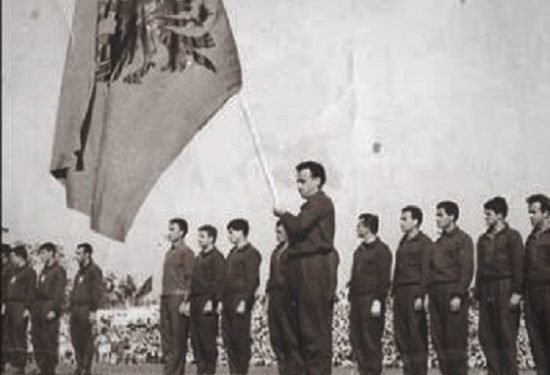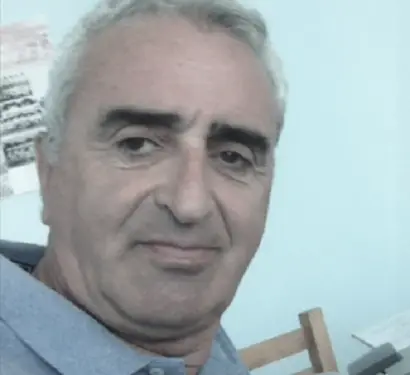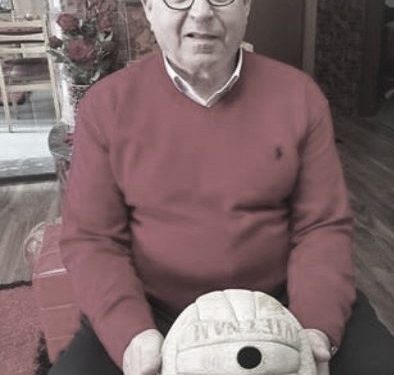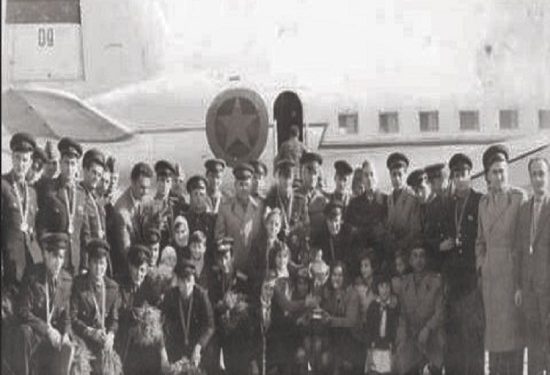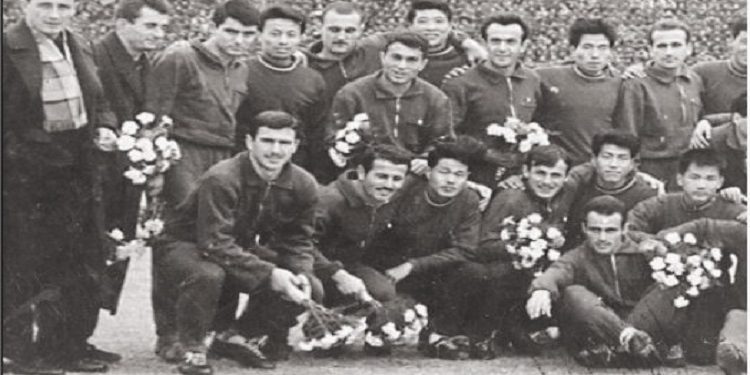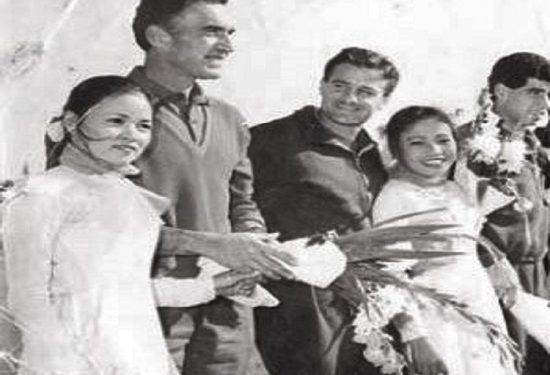From Uvil Zajmi
Memorie.al / Luigj Bytyçi, the former midfielder of the legendary “November 17” of the 60s – 70s, known by the nickname “Big Ballerina”, during a tour in Vietnam in 1963-’64, waiting for to return to Albania, diagnosed with botkin…! But what was botkini? A very dangerous virus. Moments of panic and anxiety for the player, managers, teammates and even the military medical authorities in Beijing. Today, after more than half a century, starting from the tense situation we went through with the corona virus, the deadly infection that has shocked humanity around the world, Bixhi returns to that similar event experienced by him.
In the interview we received, Bixhi recalls: “I was with ‘Partizan’ in the well-known tour of Hanoi. After its completion, on the way from Vietnam to China, I contracted jaundice, as it is popularly known. But let’s not forget that for that time it was scary. It was contagious and could spread easily.”
Then a real ordeal, from the discovery, the concern of the Chinese doctors, the Beijing-Moscow train journey, the forced “non-stop” international health service, to the fear of friends. The return from Budapest on the government plane and the alarm of the danger that the presidential plane on which Enver Hoxha and the bureaucrats were traveling could have been infected. As a result, they isolated him for 21 days in the hospital. Bytyçi tells how during those difficult days, the final ball with CSKA also fell into his hands, as a relic and extraordinary memory, which he keeps very carefully at home in his personal archive.
Mr. Bytyçi, what was that tournament?
It was the tour of the “Friendly Armies of the countries of the Socialist Camp”. That’s what it was called…! It was a massive multi-state event that was organized once every 5 years. Unlike that of Leipzig in 1958, the edition of that year had a different formula, dividing the sports into several countries. For example, volleyball was played in Albania in July, basketball elsewhere, while football was to be played in Vietnam, Hanoi, in December 1963.
Let’s talk a little about the launch, how do you remember it…?
It was the middle of November and we went from Tirana to Moscow by plane. We stayed in Moscow for almost a week, as the plane could not travel due to bad weather and fog. The clouds were down and I could not even land in Omsk, Minks, Istrutk. While waiting, I remember when in the well-known Russian newspaper, “Pravda”, we read the announcement about the assassination of the American president, Kennedy. Then we also saw it on TV. We saw each other without making any comments between us.
After you arrived in Beijing, what happened?
We were well received in Beijing. It was cold there too, low temperatures. Then they took us on a military plane to Naning, in the South China Sea, near Vietnam. It was the same climate as Hanoi. We spent some time preparing. We did training, we also played some friendly matches. From Nanning to Hanoi, where we were settled in good villas guarded by soldiers. It was a tense situation, especially in South Vietnam.
Different treatment how was the food?
It was a tiring tour, lasting two weeks or so. We held matches not only in Hanoi, but also in other cities. Well-known teams, with quality players, participated. There was great rivalry until the end. We were more privileged than others and treated differently. But, since we were not familiar with their varied cuisine, we preferred rice and chickens, as safer for any kind of infection, etc.…!
Let’s talk a little about the matches, how did they take place?
In the group matches, we won 2-1 against ‘CDNA’ of Sofia, then 4-0 against ‘Honved’. In the quarter-finals, we beat ‘Forverst’ of Berlin 3-1, with the unforgettable goals of Panos, and ‘Honved’ 1-0 in the semi-finals. In the final, a strong match was waiting for us with the Russians of “CSKA” of Moscow. Since the relations, the friendship with the Soviets was not as before, to soften the situation, the organizers put the teams in a hotel. The day before the meeting, the Minister of Defense of Vietnam, Zhi A Pin, if I remember his name correctly, also received us.
Crucial final and it took extra time, didn’t it…?
The match took place in Hanoi and the 90 minutes ended 0-0. Then in overtime the Soviets scored and won 2-0. 90 minutes that was played with rivalry, but without any problems from both teams. President Ho Chi Minh and Prime Minister Fan Van Doug were present at the stadium. In the end, “Partizani” received the silver medals.
Do you remember the protagonists of that triumph?
From “November 17”, it was me, Pavllo Bukoviku, then Sul Maliqati, Mikel Janku, Osman Mema, Fatmir Frashëri, Iljaz Dingu, Lin Shllaku, Miço Ndini, Bardh Deliallisi, Tomorr Shehu, Miço Papadhopulli, Bert Jashari, Zaho, Foto Andoni , Panajot Pano and Refik Resmja. Kolec Kraja did not come injured. The doctor was M. Karanxha, a former athlete and trainers Loro Boriçi with Xhep Spahiu. The delegation consisted of representatives of the Ministry of Defense, while the club officials were V. Naço, D. Milo, while the chairman was Besim Fagu.
Back to China, what happened there?
After the tour ended we returned to China and the New Year caught us in Shanghai, where we celebrated it. Congratulatory telegrams from Albania were read for the success achieved. Then training, friendly meetings in some other cities, Canton, Shanghai, etc. We came to Beijing, from where we were to leave for Albania. I always stayed in the room with Pavlo Bukovik.
When did the first signs of the disease appear?
I felt fatigue, weakness, lack of appetite. I express my concern to some friends, among them the doctor Rrem Karanxha. They then informed headquarters. The headquarters immediately notified a military health center, which came and took my tests. Eventually I talked about having the botkin virus. I didn’t even think about it and of course I was shocked. Even the Chinese doctors were alarmed, as it was the last days of their stay in Beijing. They insisted and wanted to put me in the hospital immediately, because according to them I should not leave. They were seriously worried because we were dealing with a contagious disease. I had to isolate myself for treatment.
Why didn’t you stay?
From the fact that I would be left alone there, in a big country and country. In addition, the return to Albania, as I was informed, would be done with the ship “Vlora”, which came once every few months. Family members would be worried. We decided together and so I was forced to go with the team. A long train journey, more than a week, Beijing – Moscow, passing through Mongolia, Siberia, non-stop, day and night…!
Was there any commitment or special treatment from the Chinese towards you?
Our embassy was also engaged in Beijing. I remember Kadri Velçan from Elbasan, her driver, who notified the relevant authorities. They had ordered that I would have special treatment. From the food that the Chinese dieticians had prepared by means of a menu, which they had conveyed to the train. At those stations where he stopped for fuel, food or passengers, even though the personnel changed, those of the following service prepared the treatment according to the daily menu of the Chinese doctors.
In the wagon, you were with Boric in a room. How did he react?
The train had sleeping cars for two and four people. Someone had to stand up for me. I will never forget Loro Boriçi, he was the one who agreed to stay with me. He agreed without telling me and he told me this on the way. Of course, everyone was interested, they came, they asked, especially Besim Fagu, then Pano, Papadhopulli, Shehu, Mema, Frashëri, Bukoviku, without exception.
However, you remained “isolated”, didn’t you?
They had given instructions that I should not walk around the wagons and have as little contact with people as possible. I felt like I was being controlled by train staffs who were instructed to monitor me for fear of spreading it to others. The disease was contagious, with great danger for the time, and I had to remain isolated. Even if the footballers had a small health concern, their friends would get the idea that they were infected. Miço Papadhopulli also got sick; he was scared because he thought that he might have caught it too or that I had infected him with the virus. But it was a cold; she was treated with antibiotics and passed.
An organization of medical service 24 hours nonstop how was it possible?
In every country where the train would pass and stop: as in Mongolia, Siberia in cities like Ulan Bator, Itsruks, Minsk, etc., although the temperatures were minus 20 degrees Celsius, a medical team was waiting at the station, looking for the number of the wagon, the cabin and the patient. They had masks on their faces, entered, gave me the necessary injection that the Chinese had determined. It was a mandatory international law and service for the care, treatment and provision of a case of such infection.
Long way, why by train and not by plane?
We came by train as that was the order from Tirana. The reason was that a while ago, in the Itsruks Mountains of Siberia, a plane had crashed and among the passengers were some family members of our embassy in Beijing. Together with them the writer Drago Siliqi. Since we were a large group, and to avoid any risk, it was judged and instructed that the trip be made by train, as safer.
You arrived in Moscow, but were quickly driven away. Why?
In Moscow, we were accommodated in the “Sheremetyevo” airport hotel, the second largest in terms of size. We stayed there for a few days, as the Russians did not want us to stay long and had prepared the Moscow-Budapest flight. In the meantime, 10-12 days had passed and the disease was being treated carefully without neglecting it at any moment, accompanied by the medication that the Chinese doctors had given me.
And in Budapest, was there any hesitation from the Hungarian doctors?
As the disease was dangerous and contagious, as soon as we arrived in Budapest, where we stayed for several days, I continued to be under intensive observation. Not knowing exactly what degree the infection was, even the Hungarian doctors did not know what to do with me. Someone said I should be hospitalized, someone not. It was Besim Fagu who vetoed: “Bytyçi will come with us”.
The return to Tirana was comfortable, because you traveled on the presidential plane, right?
There was no plane in Budapest, as the “Malev” line to Tirana came once a week. We got there when he had just left and we had to wait a week until the following Tuesday. We could not wait that long, as they were waiting for us in Albania. Based on the echo that “Partizani” had made in Hanoi, to honor and appreciate us, the state made available the government plane. I remember an “Il-14” or 18, with number 09. Thus, on January 20, 1964, the presidential plane landed at Tirana airport.
Beyond the governmental enthusiasm, how were you received?
We found an enthusiastic atmosphere and in that festive situation, no one remembered me and everyone went home. In the meantime, I selected some spoils, for fear of introducing and spreading the infection in the house. I told my parents that I had jaundice, so I needed to be careful, and my host mother was extremely involved.
An army that is alerted, a dicaster on foot. Why?
Meanwhile, the leaders of the army were alarmed, since in general information given about the tour, they had also treated my case as an infectious disease. “What did he come with? Even the one with the government plane…?!”, was the concern. It was about the plane on which Enver Hoxha and other state leaders were traveling. I remember that the crew of the plane was the pilot Babaçe Faiku, Masar Aga and Hamit Ulqinaku.
Was immediate isolation requested for you?
They were interested in my whereabouts and after two days they came to my house. “You must be hospitalized urgently for a check-up and analysis”, they told me. In the Military Hospital they wanted, and even tried to take me by force. But, after talking with Lame Konomi, I went to the civilian one, where I stayed for 21 days under the care of Elmaz Lapi, a doctor in the infectious disease department.
Is it true that the plane was urgently disinfected?
They wanted to justify that action with that disease…! They asked again and again: “How was it possible for a person with that disease to get on the government plane”, since I should never travel on the very one used only by the Politburo. As they told me later, they had disinfected it two or three times, fearing that the virus might have spread inside it.
Bytychi, where could you have gotten the infection?
I say that I got it during the time of transition from Vietnam to China, when after the end of the tour, we followed the matches in the South Cantons. There are many opportunities there. Not in Shanghai, not even Beijing, since I went there with the infection.
A slightly different question: Do you have the Hanoi final ball?
When the game ended, the field was flooded with people and football players celebrating. No one remembered or cared about the ball, when after the moment the referee blew the end, it was left to me. I took it and for many years no one knew that I had the final ball. A special ball, with valet, as you can see. I keep it carefully together with the cup, the medal.
And lastly, why do they call you “Big Ballerina”?
Not that I was the best player or that I scored many goals, among them the one in Lushnja against “Tractor” that gave us the first championship title as “November 17”. But, I think it had something to do with fine art…! Classical music and friendship with artists have been my passions. And therefore, this has been my style of play, which had elements of an artistic-technical football, like a “ballerina” on the field. A name given to me by the people, the fans then, but even today that’s how they call me, they know me. Memorie.al




